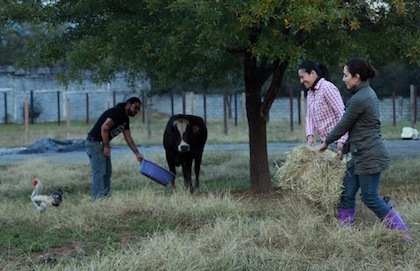Every day of the week, The Pollination Project (www.thepollinationproject.org) provides $1,000 in seed funding to an individual who is working to make the world -- or just their own community -- a better, more peaceful and more sustainable place. Here are the extraordinary people and ideas changing the world this week:
Seth Dixon is a college geography professor who recognized that the often rapid cultural, political, and environmental changes occurring in our world make it difficult for students to become globally aware citizens. He created the web platform Geography Education to deliver current, supplemental materials that support the field of geography as a tool for social change. The site has received more than half a million hits from students and teachers seeking the most up-to-date information about our evolving planet.
Jenny Edwards is using her combined experience in animal protection and criminal justice to increase awareness of the difficult and sensitive issue of sexual abuse of animals, and aid in the prosecution, charging, and sentencing of these crimes. Jenny and sociologist Dr. Carol Glasser have coauthored a groundbreaking research study based on 15 years of data on animal sex abuse, and Jenny is using the findings to train law enforcement officers in this field.
Holly Schlaack founded the Invisible Kids Project to share tools and information to benefit kids in the child protection system. Once a caseworker and Guardian Ad Litem in Cincinnati, Holly is the author of Invisible Kids: Marcus Fiesel's Legacy about the crises facing foster children today. The Invisible Kids Project works through public engagement, education, and common-sense reform, using the power of empathy, wisdom, and community to bring about a system of safety and healing for extremely vulnerable children.
 Adhara Talamantes and colleagues Gustavo Olvera, Blanka Alfaro, Adriana Alva and Eli Hernández founded Santuario Libres Al Fin! ("Free at Last!"), Mexico's first farm animal sanctuary. Located in the outskirts of Monterrey, in the state of Nuevo León, Santuario Libres Al Fin! provides a permanent home for rescued farm animals, and creates public informational campaigns promoting animal protection and veganism. The group also lobbies against bullfighting, cockfighting and circuses, and in collaboration with the Franz Weber Foundation is developing viable alternatives to the use of draft animals in Monterrey.
Adhara Talamantes and colleagues Gustavo Olvera, Blanka Alfaro, Adriana Alva and Eli Hernández founded Santuario Libres Al Fin! ("Free at Last!"), Mexico's first farm animal sanctuary. Located in the outskirts of Monterrey, in the state of Nuevo León, Santuario Libres Al Fin! provides a permanent home for rescued farm animals, and creates public informational campaigns promoting animal protection and veganism. The group also lobbies against bullfighting, cockfighting and circuses, and in collaboration with the Franz Weber Foundation is developing viable alternatives to the use of draft animals in Monterrey.
Angelo Drummonds and Malik Evans are Green for All college ambassadors at Morehouse College who work to bring environmentally progressive ideas to campus. Malik, who has been gardening since age ten and understands the benefits of clean organic food, and Angelo, a Bonnor scholar with community project experience, along with permaculture designer Brandy Hall, are creating a permaculture garden on Morehouse's campus with a mosaic of recycled glass. We thank our partner Green For All for referring us to Angelo and Malik.
Karen Conquergood has spent 25 years helping people in the Northern Coast of the Dominican Republic, some of the nation's poorest communities. She currently assists residents of eight different villages with food, water, shelter, medicine, medical care, and other support, while operating a free eye clinic with about 300 patients per week. Now, Karen is adding a program to provide medical outreach, home visits, and food delivery for families impacted by HIV/AIDS.
Congratulations to our grantees this week for their outstanding work.
These are just a few examples of what a little seed money can do when put in the hands of someone with a vision and a plan to change the world.
If you were given $1,000, how would YOU seed the change?
The Pollination Project makes $1,000 grants every day, 365 days a year to individual changemakers. Please go to our website at www.thepollinationproject.org for funding guidelines and application.
